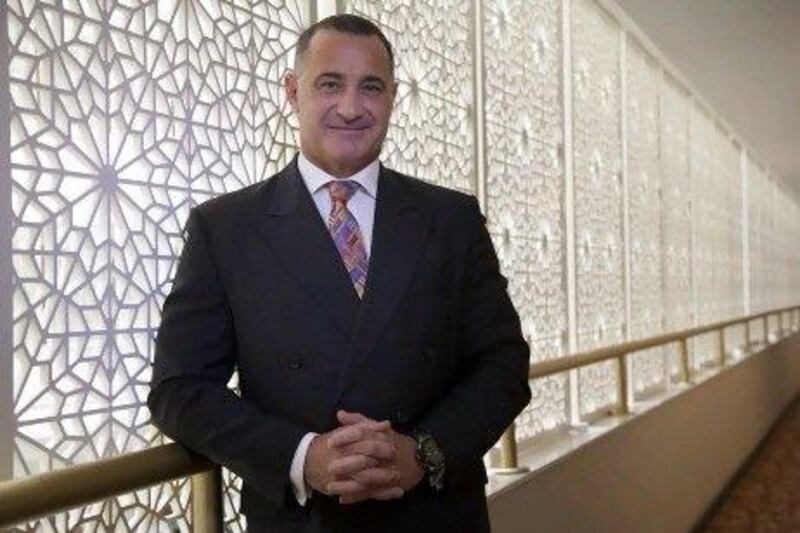Lenders have an obligation to ensure they do not take on clients who will later run into financial trouble such as defaulting on debts or writing bad cheques, said the chief executive of United Arab Bank (UAB).
Banks must take "know-thy-borrower" as a mantra, said Paul Trowbridge, the bank's top executive, which would go a long way towards reducing the number of bounced cheques in the banking system.
Mr Trowbridge is just the latest leading figure in the UAE banking industry to speak out about the dangers of bouncing cheques and how the prevalance of the illegal practice weighs on the financial services sector and the economy as a whole.
This week Hussain Al Qemzi, Noor Islamic Bank's chief executive, said cheques were an outdated form of payment that should be replaced with a better mechanism. His statements were followed by a call from Ali Al Nuaimi, the head of the Federal National Council's finance committee, for the Central Bank to review the number of bounced cheques and try to find a solution.
Mr Trowbridge said that the lack of a fully-developed legal infrastructure, including a personal bankruptcy law or a credit bureau, forces banks to take their own view over which customers seem most likely to default.
"Within the process at the moment, there's a degree of flexibility and tolerance based around natural justice," he said.
Customers in danger of bouncing cheques should come forward sooner rather than later and level with bank creditors if they fear the possibility that their cheques could bounce, Mr Trowbridge added.
Asked how banks could ensure that customers come forward when they encounter trouble, he said: "You choose the right customers in the first place."
The issue of failed cheques has been the focus of public criticism after The National reported on Monday that Dh55.3 billion (US$15.05bn) cheques worth were returned last year, according to data from the Central Bank.
The figure reflects one dud in every 20 cheques used for payment, although the figures do not distinguish between cheques that were invalid because of damage or missing information, and how many bounced.
A bounced cheque is a criminal offence in the UAE. Banks operate a "four strikes" rule with customers, cutting them off from the financial system after four bad cheques and alerting the Central Bank. Analysts say this means in effect writing off the debt's recoverable value entirely.
In the absence of a federal credit bureau, still a work in progress after years of efforts to establish it, banks had to take strategic decisions about who to lend to and how likely those customers were to default.
That choice had led United Arab Bank to dodge the worst of Dubai's property crisis, said Mr Trowbridge.
With a cleaner balance sheet than many now-humbled commercial rivals, the bank is now stealing market share, growing its lending book 18 per cent during the first half of the year when the sector as a whole has increased loans by 1.8 per cent.
By the third quarter, the bank's lending had increased by 24 per cent compared with the start of the year. Central Bank statistics for the corresponding period were not available.
Mr Trowbridge said UAB would add more than five branches to its current 20 offices next year, including its first new Dubai offices in more than a decade.
United Arab Bank reported a 13.6 per cent increase in net profits to Dh104.2 million during the third quarter, compared with the same period a year earlier.
Cheques are used for more than Dh1 trillion of payments each year, used to back everything from car loans to corporate financing.
They must be used as security by law for certain transactions, including mortgage lending.
The current legal arrangements around bounced cheques are "flexible in circumstances", said Mr Trowbridge.
"It imposes a very good form of discipline on people, both on banks and borrowers," he added. In the mind of a customer, the criminal aspects of a bounced cheque were "a very very good reminder of their obligations", said Mr Trowbridge. He pointed out that customers are forced to think "What's my plan B?".
"There will always be situations where unfortunate things happen. I'm sure they will get a sympathetic hearing in practice, as in theory."
Dozens of bank customers have fled the UAE as a result of negotiations gone wrong with banks over mortgage payments on properties under development.
In such cases, the threat from the bank to pursue criminal action was the factor that convinced customers they were better off fleeing the country.
Remaining bank customers have struggled to refinance mortgages in the meantime, paying higher rates than those currently being advertised by banks as they attempt to revive the property market.
[ ghunter@thenational.ae ]





